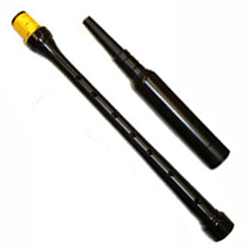 That’s what I said. “”Don’t buy a bagpipe””, unless you talk to a teacher. This is one of the few instruments that exist where you don’t actually start on the bagpipes themselves. What’s needed is a practice chanter. The practice chanter looks a lot like a recorder that you might have played in school. It is different so you can’t use that old recorder that you’ve been keeping since that time. Practice chanters range in prices from $50.00 to $200.00 depending on whether they are plastic or wood. I prefer the Gibson practice chanters made of polyplenco. This is a great product starting at $75.00.
That’s what I said. “”Don’t buy a bagpipe””, unless you talk to a teacher. This is one of the few instruments that exist where you don’t actually start on the bagpipes themselves. What’s needed is a practice chanter. The practice chanter looks a lot like a recorder that you might have played in school. It is different so you can’t use that old recorder that you’ve been keeping since that time. Practice chanters range in prices from $50.00 to $200.00 depending on whether they are plastic or wood. I prefer the Gibson practice chanters made of polyplenco. This is a great product starting at $75.00.
When you get to a point where you can play a few tunes proficiently, your instructor will guide you through the bagpipe jungle. There are lots of makes and options available. Your instructor will probably recommend something that he is familiar with. You want to avoid jumping on the internet and buying the first thing you see on Ebay. A good bagpipe is Scottish made and made of African Blackwood. The options ie the bag, reeds etc are items that your instructor will recommend especially for you. Be patient. You want a musical instrument and not a wall hanging, right?”

0 Comments